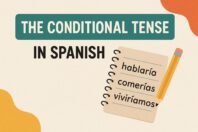How To Use The Accidental SE in Spanish

Get our free email course, Shortcut to Conversational.
Have conversations faster, understand people when they speak fast, and other tested tips to learn faster.
More infoIn a separate post on reflexive pronouns in Spanish, we talked about the reflexive se and how it is used. Today, we’ll focus on a related topic – the accidental se in Spanish.
Before we continue, it’s important that you have a solid understanding of reflexive pronouns in Spanish.
Reflexive pronouns help us indicate that an action is being performed by the same person who receives the effects of that action.
For example, instead of saying:
- Hice la cena para mi – I made dinner for me
You can say:
- Me hice la cena – I made myself dinner
If you aren’t familiar with reflexive pronouns in Spanish, then we recommend that you read this guide first.
Now, let’s talk about the accidental se in Spanish.
The accidental SE (or accidental reflexive) is a structure that we use, normally to imply that something happened by accident or unintentionally.
The formula is simple:
- se + indirect object pronoun + conjugated verb + noun
In this structure, the indirect object pronoun (me, te, le, nos, les) is used to indicate who or what the action happened to.
It’s also worth noting that the conjugated verb will always agree with the noun that follows it, rather than the subject.
Let’s see some examples of this in action.
- Se me cayó el teléfono en el agua – I dropped my phone in the water
- (A él) Se le olvidó la tarea – He forgot his homework
- ( A ella) Se le cayó su bolso – She dropped her bag
Remember, the accidental se in Spanish is used to express something that happened unexpectedly or accidentally.
A byproduct of this is that you’ll often end up using the same verbs, and below are the most common ones to know.
| English | Spanish | Reflexive |
| To forget | Olvidar | Olvidarse |
| To break | Romper | Romperse |
| To leave behind | Quedar | Quedarse |
| To got dirty | Ensuciar | Ensuciarse |
| To drop/to fall | Caer | Caerse |
| To run out | Acabar | Acabarse |
| To burn | Quemar | Quemarse |
| To lose | Perder | Perderse |
| To spill | Derramar | Derramarse |
And now, some examples of these verbs being used with the accidental se.
- Se me olvidó comprar la leche – I forgot to buy the milk
- ¡Mira, se te rompió el pantalón! – Oh look! Your pants broke!
- Se le quedó el almuerzo en casa – He left his lunch at home
- Se me ensuciaron los zapatos – My shoes got dirty
- Se les cayó el jugo en la alfombra – They dropped the juice on the carpet
- Se les acabó el vino al restaurante -They ran out of wine at the restaurant
- Se nos quemó el pastel – We burned the cake
- Se le perdió su celular – She lost his cell phone
- Se le derramó la bañera mientras la llenaba – The bathtub was spilled while she was filling it
Accidental SE in Spanish: Exercises
1) Fill the blank space
- Al niño ___ ____ perdió su juguete (The boy lost his toy)
- ___ _____ cayó la bandeja de comida (I dropped the food tray)
- ___ _____ olvidó llamarte cuando llegamos (We forgot to call you when we arrived)
- ___ ____ rompieron las pantimedias (Your pantyhose broke)
- ___ ____ triste porque se le quemó la cena (She is sad because her dinner was burned)
- Estoy molesta, ____ ____ derramó el café en el sofá nuevo (I’m upset, I spilled coffee on the new sofa)
Accidental SE in Spanish: Answers
1) Fill the blank space
- Al niño se le perdió su juguete
- Se me cayó la bandeja de comida
- Se nos olvidó llamarte cuando llegamos
- Se te rompieron las pantimedias
- Ella está triste porque se le quemó la cena
- Estoy molesta, se me derramó el café en el sofá nuevo



